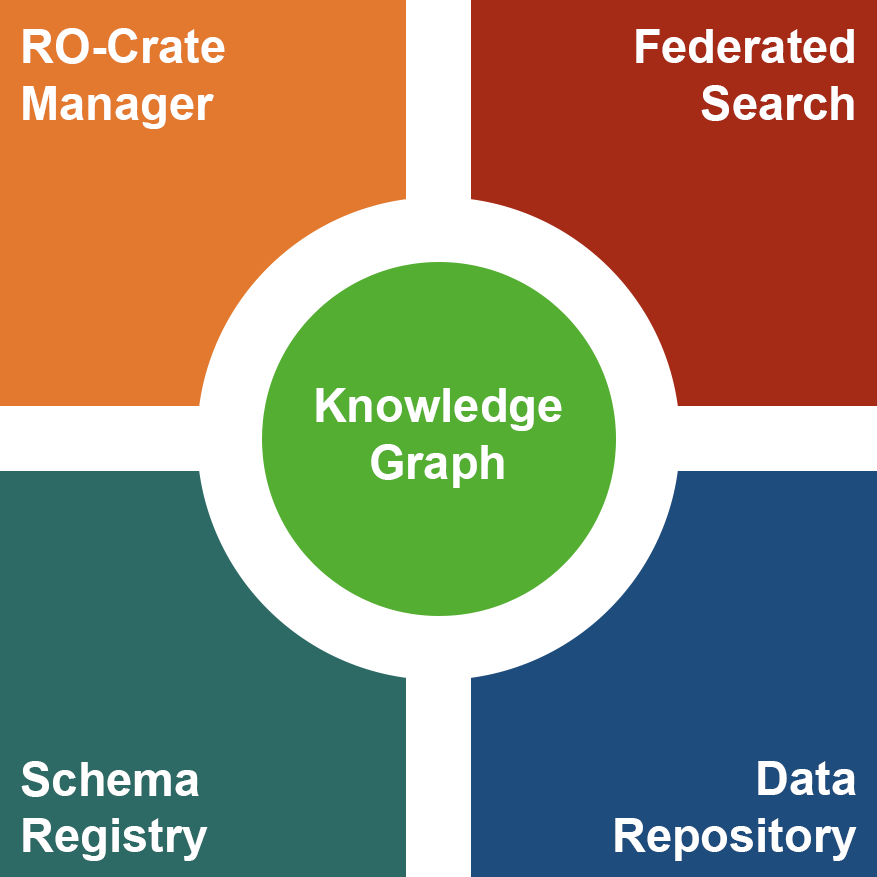The Data Repository Platform (ARP) is designed to make research data available, accessible and retrievable in accordance with FAIR guidelines. (For more information on FAIR guidelines, please see our Glossary.)
The ARP is not just a single data repository for research data, but a complex system providing a number of interrelated services. Its components are the ARP Data Repository, the ARP AROMA (Ro-Crate Manager), the ARP Schema Registry, and ARP Federated Search. The parts are connected by the central Knowledge Graph, which also allows for internal data sharing between components.

ARP Data Repository
 The ARP Data Repository is an enhanced version of the Dataverse data repository, which was created specifically for storing research data. (For more information on the Dataverse Project see the Harvard Dataverse homepage.) Most of our users will primarily use this service. The interface allows the creation of data packages containing research data, documentation, research software and other related files that support the results of a research project, which the researchers wish to archive as a single whole. The data sets can be associated with metadata that describe them and help them to be found, thus supporting the linking of data sets and collaboration between researchers and projects. The completed data sets are stored securely and are given unique identifiers that can be referenced in publications.
The ARP Data Repository is an enhanced version of the Dataverse data repository, which was created specifically for storing research data. (For more information on the Dataverse Project see the Harvard Dataverse homepage.) Most of our users will primarily use this service. The interface allows the creation of data packages containing research data, documentation, research software and other related files that support the results of a research project, which the researchers wish to archive as a single whole. The data sets can be associated with metadata that describe them and help them to be found, thus supporting the linking of data sets and collaboration between researchers and projects. The completed data sets are stored securely and are given unique identifiers that can be referenced in publications.
Non-logged-in users can also search among research data in the data packages, and download and reuse data available without restriction. Access to restricted research data or data available for registered users only requires registration and sometimes meeting other, specific, conditions, too.
The ARP Data Repository differs from other Dataverse-based data repositories in that
- it not only allows for metadata to be specified at the level of data packages, but also for rich file-level metadata (see ARP AROMA service);
- metadata sets may be modified and new metadata sets can be introduced (see ARP Schema Registry service);
- data packages are also available as RO-Crate objects (for more information on RO-Crate objects, see the AROMA service documentation).
The service is available at: https://repo.researchdata.hu
ARP Federated Search
 Data repositories associate metadata with research data, which (together with proper documentation) is intended to ensure the discoverability of research data and data packages. Searchability of data packages by data package-level metadata within the ARP Data Repository (as with any Dataverse repository) is possible directly from the repository interface. However, it is also possible to specify file-level metadata in the ARP Data Repository, and this is provided by the ARP Federated Search.
Data repositories associate metadata with research data, which (together with proper documentation) is intended to ensure the discoverability of research data and data packages. Searchability of data packages by data package-level metadata within the ARP Data Repository (as with any Dataverse repository) is possible directly from the repository interface. However, it is also possible to specify file-level metadata in the ARP Data Repository, and this is provided by the ARP Federated Search.
The service allows searching not only research data stored in the ARP Data Repository but also those in other repositories. At present, Hungarian-related research data and data packages are available for searching in the University of Debrecen Data Repository, the Research Documentation Center Data Repository at the Center for Social Sciences and Zenodo.
The service is available at: https://search.researchdata.hu
ARP AROMA (Ro-Crate Manager)
In most data repositories, metadata can only be created at the data package level. In the ARP Data Repository, the ARP AROMA feature allows you to add custom metadata to files within the hosted data packages. The metadata of data packages and the files within them can be defined according to the public metadata schemas stored in the ARP Schema Registry. The ARP AROMA service is a unique development. (For more information on how to use it, see the AROMA documentation).
File-level metadata allows for file-level search and retrieval of research data, provided by the ARP Federated Search.
The AROMA service does not have a separate URL; it is built into the ARP Data Repository and is available from the pages of each data package.
ARP Schema Registry
 The ARP Schema Registry is a Cedar-based metadata repository. In general, data packages in data repositories can typically be annotated with descriptors according to various standard metadata sets (e.g. citation metadata, astronomical metadata, etc.). However, these sets are rather limited and difficult to extend.
The ARP Schema Registry is a Cedar-based metadata repository. In general, data packages in data repositories can typically be annotated with descriptors according to various standard metadata sets (e.g. citation metadata, astronomical metadata, etc.). However, these sets are rather limited and difficult to extend.
In the ARP Schema Registry, users can create new metadata sets (schemas) according to their specific needs. Once they have been defined and accepted by ARP, the schemas defined by users to describe their data packages, or even the files within data packages, can be immediately used via the ARP AROMA service.
The service is available at: https://schema.researchdata.hu